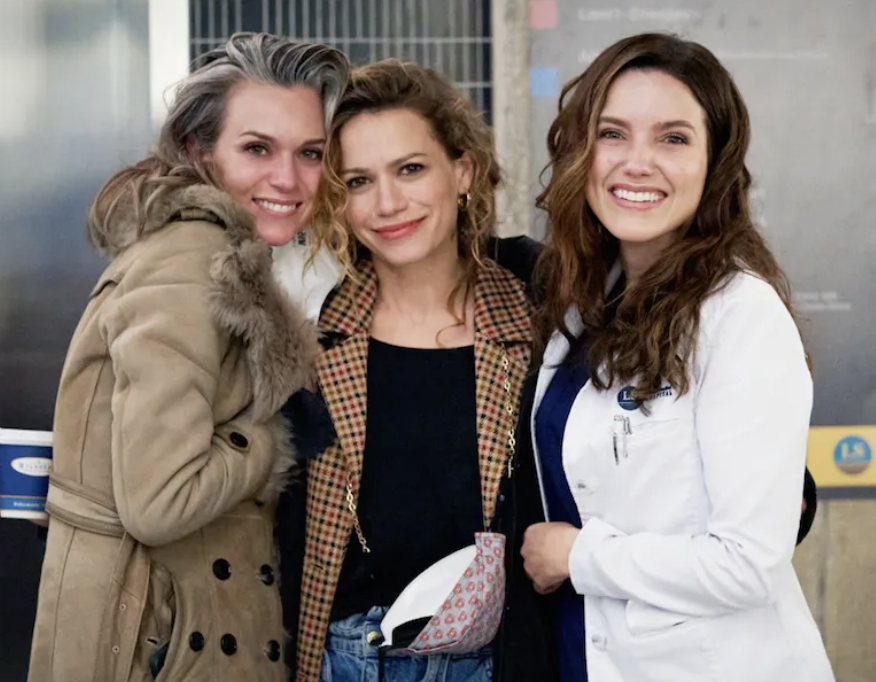One Tree Hill Reboot
Let’s Begin
I’m going to start where this journey began for me. The announcement of a One Tree Hill Reboot. One Tree Hill has been a comfort show for me since college; I bought all the seasons on DVD around 2011 and had rewatched it 2 or 3 times over the years. Last year, it was announced that Sophia Bush and Hilarie Burton Morgan were working with Netflix on a reboot of the show so natural it was time for a rewatch (it has been a while since I’d seen it). This time though it hit me differently. Of course, it was me who was different, no longer a college student trying to fit in looking for friends in TV characters, I am an adult in my thirties and furthermore I was studying Public Health. It was hard to ignore the simply awful health messaging that occurred in the original show. The trauma without therapy, the binge drinking, the sex and lack of conversations around it, and the blatant inaccuracies. A scene where Nathan refers to his mom Deb as a junkie inspired me to create a blog talking about health and media representations because like it or not media shapes cultural perceptions and can have a protective or detrimental affect depending on the narrative.
Having followed Sophia Bush and Hilarie Burton Morgan on social media for at least a decade, I imagine they both care deeply about the effects of the messaging that is going out to their viewers and more generally the well-being of the population. So, I have come up with some ideas of health-related topics and improvements that I would love to see in the reboot. Hopefully, one of them or someone on the production team will see this and solicit my help or the help of something like Hollywood, Health, and Society in the creation of plot lines and dialogue in the reboot. Also this article assumes some knowledge about the characters in One Tree Hill, I don’t think seeing the show is totally necessary to understand my thoughts but I don’t spend much time explaining the relationships as that would make this a much longer post.
Trauma and the Need for Therapy
The first point, if the women in this show return in their original roles, that ALL need therapy! The amount of trauma the original series put all of them through was immense. Sophia Bush’s Brooke Davis was all but abandoned by her parents as a teenager, witnessed her best friend get shot during a school shooting, and suffered an assault at her storefront. Hillarie Burton Morgan’s Peyton Sawyer went through so much; she was cheated on, shot, had a stalker who tried to kill her, then when she was finally settled and happy with Lucas, she had a pregnancy issue that threatened her life (pretty sure this was wildly inaccurate as well, but more on that later). If Bethany Joy Lenz’s Haley James Scott returns, it is rumored she will not be, she had a kid at 18, her son was kidnapped by his nanny and then rescued by her murderous father-in-law. Feels like the simple presence of Dan Scott would give them all a reason to need therapy without the litany of wild drama and traumatic storylines. This is not a comprehensive list merely an example of what the characters were put through and all between the ages of 16 and 26.
Alcohol and Substance Use
My second thought and the inspiration behind writing this was Deb’s addition storyline, in particular Nathan referring to his mother as a “junkie” when she was struggling with addition after years of being in an, at best, emotionally abusive relationship with a narcissist. Prior to the show killing him off the show also occasionally painted Keith Scott with some alcoholism with his brother calling him boozy. Neither of these characters received any grace for their addiction which is a disease not a character flaw. The “junky” and “boozy” labels are harmful to people and society. Using reductive language takes some of the humanity away from those dealing with substance use disorders and keeps the cultural narrative in stigma rather than help and support. Another problem with the One Tree Hill alcohol narrative is the amount the teenagers drank on the show. This is not isolated to One Tree Hill, it was an issue across early 2000s teen dramas, just look at the OC.
While the media tends to enjoy the use of substances for dramatic effect, most teenagers do not binge drink as many of these shows depict. According to a 2023 SAMHSA study approximately 27% of 10th graders drink alcohol, a statistic that is not at all reflected in media portrayals of teens. What’s more is the media has the power to show teens not drinking which could strengthen the understanding that drinking in high school is not the norm; nor is it good for you.
As for the adults, in the later seasons it appears that Deb was successful with recovery although nothing useful was ever mentioned about it. Moving into a new show based on the original there is an opportunity for a meaningful conversation about addiction its risk factors and helpful ways of treating it as the disease it is rather than moral failing. The first few episodes of the season where Nathan messed up his basketball career (I think it was season 5) he had some behaviors aligned with alcohol dependence but then quit “cold turkey” for his family. If his character reappears, he could have more struggles given his mother’s history of substance use disorder but then receive help and treatment aligned with medical recommendations.
Lucas and HCM
Next up, is the storyline that was the most aligned with what the condition actually is and that is Lucas and HCM. HCM stands for Hypertrophic cardiomyopathy, it is a heart condition that since I am not a doctor I don’t fully understand so I do not want to describe it in detail. However, from cursory research it seems like while overdramatized in the show the depiction was basically accurate. The odds of having HCM if your parent has it is fifty percent. The medications to treat it can cause differences in athletic performance and until a recent study participating in intense sports was not advised. Additionally, it can cause heart attack and sudden death in rare but not inconsequential numbers. I’m not sure it would affect a seventeen-year-old the way the show did but overall, this was probably the best and most accurate health condition depicted in the original show.
Peyton and Pregnancy
After the most accurate storyline my natural inclination is to highlight one of the least accurate health depictions in the show: Peyton and placenta previa. Again, not a doctor, so take what I’m saying with a grain of salt, but after doing some quick internet research this plot was so incredibly inaccurate it could be harmful. If memory serves, early in her pregnancy Peyton experiences severe pain and passes out; Lucas find her on the floor of their house. From there the show goes on to inform viewers that she has placenta previa and could die in childbirth. Resulting in Lucas and Peyton debating whether to terminate the pregnancy. First, according to the Mayo Clinic website placenta previa typically occurs in the second half of a pregnancy and involves bleeding not pain. Second, it seems like many of the deaths from placenta previa come when the condition is unknown. It appears that in many cases a c-section will resolve the issues of placenta previa. The final issue with this storyline is that Peyton has 0 of the risk factors generally associated with placenta previa. The risk factors according to the Mayo Clinic site are: Have had a baby, have had a previous C-section delivery, have scars on the uterus from a previous surgery or procedure, had placenta previa with a previous pregnancy, are pregnant after having an assisted reproductive technology (ART) procedure for treating infertility, are carrying more than one fetus, are age 35 or older, smoke, and use cocaine. I don’t mean to say it couldn’t have happened to someone like her, but it seems unlikely and there are plenty of other conditions around pregnancy that could have been more relevant and informative. The United States has abysmal infant and maternal health outcomes compared to other wealthy nations. Depicting this issue in this way is almost irresponsible given then number of people who watch the show.
Moving into the future and the reboot but staying on the topic of maternal health*, the reboot could be used for some health education and highlight the problems with the legal restrictions around providing abortions in southern states. This topic is important because abortions are healthcare! And rather than focusing on fictional and inaccurate portrayals like placenta previa there is an opportunity to shine a light on what happens when people do not have access to procedures to end a pregnancy. Especially when said pregnancy could result in the death of the birthing parent. Or what happens when doctors are afraid to practice and delivery babies given current laws.
Did Brooke have ADHD?
Finally, my last point is part comment, part question, and part observation. I heard Sophia Bush, the actress who plays Brooke Davis, comment on having ADHD on a podcast. My question is: did she play Brooke as ADHD coded? I doubt at the time that was her intent but some of the character’s traits line up with ADHD. In the early seasons she was impulsive often drinking and then saying things that were explosive to her friend group. Throughout the series she was depicted as having trouble focusing, experiencing restlessness, and had difficulty with organization. As a person who was recently diagnosed with Autism and ADHD I wonder if growing up seeing someone like Brooke Davis as neurodiverse would have made me feel less alone. I understand why it wasn’t spoken about while the original show aired as inattentive ADHD is just now beginning to be recognized in women, but I wonder if this is something that could be explored in the reboot.
That’s all for now I hope you enjoyed the 5-page paper I just wrote for fun!
*Apologies for the use of maternal health, when I say this, I am referring to all birthing people. However the field is outdated and commonly referred to as Maternal Health; Maternal Health programs provide most of the statistics around child birth. Birthing people who do not identify as women typically experience worse outcomes. Similarly, people in the LGBTQ+ and BIPOC communities also experience greater risk around childbirth. One Tree Hill however revolves around a group who are predominantly white and heterosexual.
**All photos are screenshots taken from Google searches



